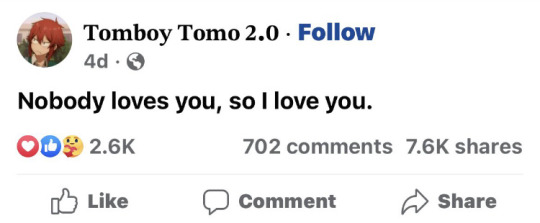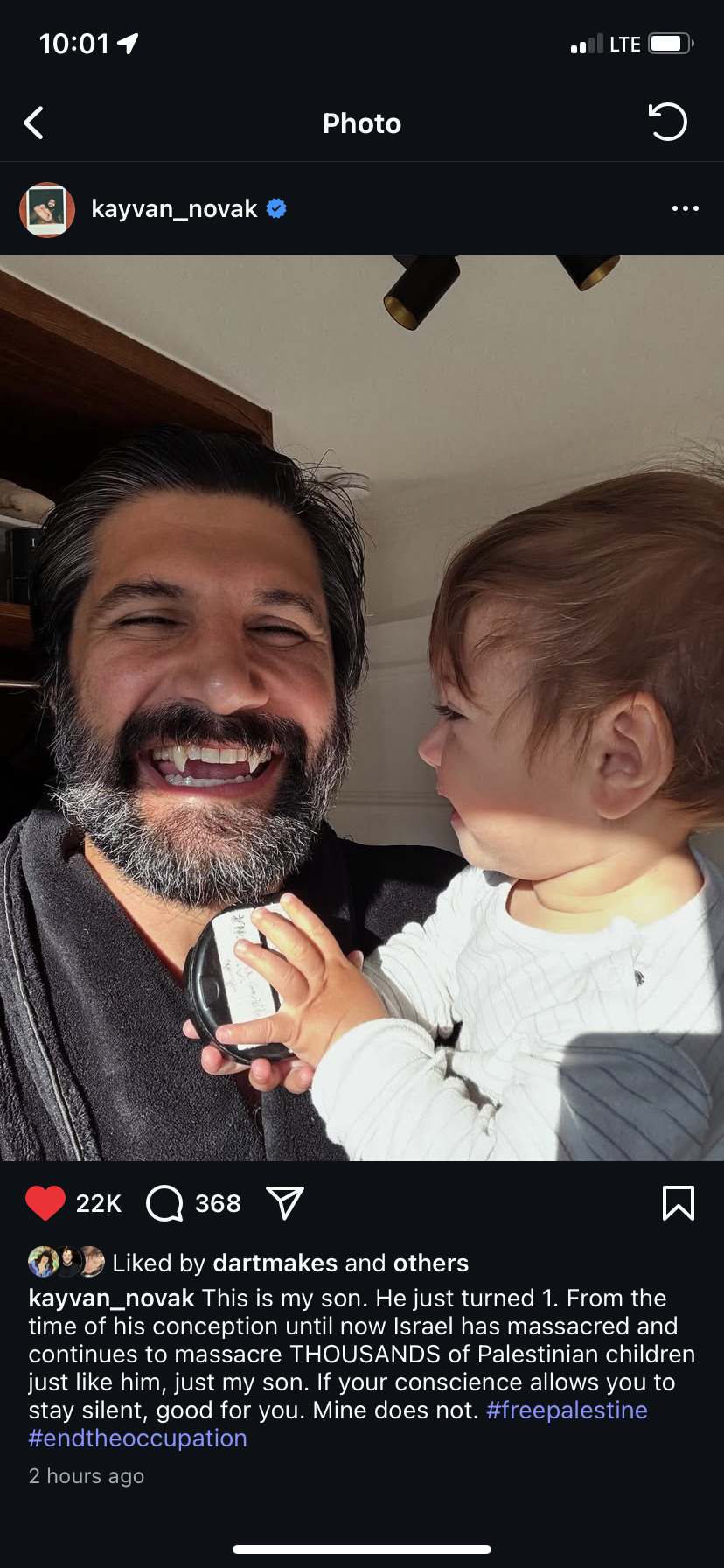Text
i think what bothers me about people making jokes about the mountain goats having good lyrics but sounding bad (which - is already a flawed premise, as they've grown they have also developed their sound, but that's neither here nor there because people have always found pleasure even in their very early, very off key, very low-fi stuff) is that the central premise of tmg's music is that anyone can make music - anyone can play the same four chords, write stuff down, and communicate an incredibly specific, moving, universally understood human feeling with just a few salt of the earth words. like it's totally okay to not like how they sound, god knows they're an acquired taste, but there's something disparaging to me about mocking their sound or darnielle's singing that is similar to people saying, like, certain experimental films are stupid, that nothing happens in them, what have you - there's this total refusal to sit down with something someone made that you think is not pleasurable and ask yourself why people like it. why are people moved by it, why would someone make it, what experience do all of these elements create together. and yeah sometimes the conclusion is "this isn't for me" or "i think this art is corny/annoying/unskilled/i plain don't like it" but let's not act like everyone who does connect with it is an idiot or that the art just spontaneously appeared one day without any thought behind it. solipsism is a child's delusion
88 notes
·
View notes
Text
The other night husband and I were watching a documentary about the yeti where they were doing DNA analysis of samples of supposed yeti fur, and every one of them came back as bears.
Anyway, the next night we watched a thing about some pig man who is supposed to live in Vermont. People said it had claws and a pig nose but walked upright like a man. Now, I happen to know that sideshows used to shave bears and present them as pig men. So every piece of evidence they gave of this monster sounds to me like a bear with mange.
So now the running joke in our house is that everything is bears. Aliens? Bears. Loch Ness monster? Bear. Every cryptozoological mystery is just a very crafty bear.
Bears. They’re everywhere. Be wary. Anyone or anything could be a bear.
531K notes
·
View notes
Text
This morning when I logged onto tumblr dot come whole dashboard was and still is full of Stephen Malkmus. And at first I thought ohhh a new blorbo ok, but it’s a whole school of mutuals now rebloging him/them?? Did I miss a holiday?
0 notes
Text
the infuriating thing is that there is genuinely so much good queer literature out there, contemporary and not, but there is also a sizeable chunk of readers who think that a book only "counts" as good queer literature if it's a) unproblematic, b) contains romance as its central focus, and c) has the characters state their orientation and/or gender identity directly to the audience using socially acceptable 21st-century terms (as opposed to resorting to cowardly tactics such as Subtext and Themes)
12K notes
·
View notes
Text
the most disorienting thing thats ever happened to me was when a linguistics major stopped in the middle of our conversation, looked me in the eye, and said, "you have a very interesting vernacular. were you on tumblr in 2014?" and i had to just stand there and process that one for a good ten seconds
253K notes
·
View notes
Text
my best tip for anyone trying to get back into reading is to remember that you can read books to avoid other responsibilities in ur life and it can become a vice if you play your cards right
88K notes
·
View notes
Text
As AI art gets harder to clock, I feel like we are going to need to have a discussion about attribution and it's probably going to bum some people out.
Because the surest way to avoid platforming, reblogging, or encouraging AI art posting is to know where every image you share originated and that's 1) boring, tedious research and 2) extremely limiting in what you feel you can reblog. But if unattributed images never gets traction, people will start attributing their images.
I've been guilty of this in the past, but for a while now it's been my policy that if I can't verify the origin, I don't share the image. That goes for stuff like screen grabs of headlines too -- more than once I've avoided spreading misinformation by saving a post to research before I reblog, then seeing the post refuted before I've been able to verify it.
And I usually try to attribute photos I take -- case in point, the "woman with shrimp" post gets a lot of attention but not one comment about it being AI, despite it being pretty similar to something you'd get from an AI. That's because I clearly state it's in a museum and link to its catalogue page.
I'm not saying this to scold anyone -- I think yelling at the Internet to cite its sources is very much a losing game -- but because I don't see this discussed much. We're such fertile ground to be fooled by AI art because we've grown accustomed to not questioning the origins of any given image. And of course I also want to encourage both OPs to attribute their images and rebloggers to verify unattributed ones.
26K notes
·
View notes
Text

happy pride everybody
#when i opend tumblr dot com this morning I had not yet remembered pride month#so upon seeing this image my anxiety spiked in anticipation of bad news#but not this time
38K notes
·
View notes
Text
Terminal Hanaki? Boring. Chronic Hanahaki? Exciting.
68K notes
·
View notes
Text
i love you. you made a mistake? i dont care i love you. you made a wrong choice? love you. you don’t think you’re good for anything? guess what you’re good for loving i love you
304K notes
·
View notes
Text
Most people would give anything to be turned into anything else, because most sex is mediocre, and the measure of its mediocrity is that it leaves us unaffected. No one falls ill; no one transforms into a fly or a cockroach; nothing changes. As the narrator of Norman Rush’s novel “Mating” sagely observes, “Sex can be various things, but in my experience the usual thing it is is considerate work on the part of both parties,” accompanied by the exchange of careful courtesies: “after you, no, after you, mais non.” No one has transformative sex all the time, and there is nothing wrong with sex that is merely pleasant. Indeed, a polite volley of pleasantries is probably the best thing that unecstatic sex can be.
Of course, many mediocre sexual encounters are rote in a more pernicious way. Heterosexual sex that follows the standard scripts, with its spankings and its schoolgirls, is not always devastating or traumatic, but its tiresomeness is nonetheless not innocuous. Women are the most obvious losers when the scenarios faithfully reënacted in the bedroom so consistently favor male predilections, but men who inherit their desires from the prevailing sexual culture—or, worse, men who feel they must satisfy a virile masculine ideal whether it appeals or not—lack the opportunity or the means to develop sexual agency. For both parties, the resultant comedy of errors is not satisfying. What nefariously underwhelming sex has in common with respectfully underwhelming sex is that neither brand is especially surprising or especially erotic.
To have sex erotically—and ethically—is to have it with someone else, and a person demonstrates her difference from the self by being impossible to predict, domesticate, or assimilate to preëxistent fantasy. It is not erotic to impose a ready-made desire onto someone pliant, or to slot her into a fetish that has little to do with her. Eroticism occurs only when someone rewrites us so completely that she rewrites even the quality and content of our appetites, and only when this radical rewriting is reciprocal.
Eroticism does not arise every time there is sexual activity, no matter how plodding, but it is also not the exclusive concomitant of love, marriage, or conventional commitment. Most sexual pairings are no more dishevelling than a game of tennis, but it is constitutive of sex that it has the potential to thrust us into metamorphosis that may be sweet, may be sinister, and may be both concurrently. When at last we grow wings, who can say exactly where we will want to fly?
Can a person consent to dying? Can she consent to a complete renewal, which amounts to the same thing?
Surely she cannot consent in the normal way. To consent in the normal way is not merely to grant permission but to grant permission on a particular basis—perhaps a reasonable expectation of pleasure, security, or safety. In any case, there is some positive inner state to which the outward utterance of license is supposed to correspond. A woman, almost always the presumed consenter in a heterosexual exchange, is exhorted to have sex with someone only when she has good reason to believe that she will have a generally happy time with him. Over and over, she is told: you don’t have to do anything you don’t want to do; you don’t have to do anything that makes you uncomfortable. Because she is assumed to know exactly what makes her comfortable, and because comfort is assumed to be a necessary condition of good sex, the procedure the consenter is instructed to follow is not unlike the operation favored by decision theorists. First, she is to imagine what sex with the partner under consideration will be like; second, she is to assign a value to the experience that she has conjured; third, she is to assign a probability of accuracy to her prediction. Having done all this, she finds herself in a position to make a rational decision, consenting if and only if she foresees that an exchange will turn out to be unimpeachably agreeable. Should she prove wrong in her predictions, should she ever feel the slightest scintilla of unease, she should withdraw her consent and beat a hasty retreat.
Three faulty assumptions are baked into this model. The first is that people in general, thus women in particular, can predict, if roughly, what a prospective partner will be like during sex; the second is that people in general, thus women in particular, can predict what they will be like during sex with a prospective partner; the third is that sex can and should be comfortable.
In fact, we are not impermeable packages of preformed desires, importing our likes and dislikes around with us from one encounter to the next like papers in a briefcase. An erotic craving is inextricable from the ferment that foams up when oneself is sluiced into another. Not only is it impossible for us to know whether an encounter will be deflating or transformative but we cannot know what sort of metamorphosis will ensue if the sex is as jarring as we can only hope it will be. We can have no more success when it comes to divining how we will change our partners than we can have when it comes to divining how they will change us—or, following Cummings, how their changes will change us, and how our changes will change them, iteratively and indefinitely. Maybe we will grow the wings of cherubs, but maybe we will find ourselves meshed with the coarse bristles of gigantic flies. All we can say with certainty is that sometimes, when it is working, sex carves out new bodies for our bodies, and these bodies can be both better and more brutal than the ones we could invent alone.
From Cronenberg’s fever dreams, we can surmise that there is a further reason to reject the decision-theoretic model of consent: not only is it impossible for us to know what we will become if an erotic encounter is transformative but we should not want to. To determine in advance what a transformative experience will churn into existence is to sap its power, for the very essence of transformative experience is that we cannot predict how it will transform us. To be sure, it is uncomfortable to stand on the precipice of metamorphosis, but unless we are willing to assume genuine risk we cannot be undone and remade.
1K notes
·
View notes
Text
My dear lgbt+ kids,
A great way to ensure you’re unhappy with your life is to just be a passive participant in it:
Never reach out first to your friends, wait until they reach out to you. Never make plans, only go out and do things if someone else invites you along. Never choose how to spend your free time, just watch whatever the algorithm throws at you. Never form an opinion on anything, just ask ChatGPT to do that for you.
Of course I only word it like that to get your attention - your goal isn’t to ensure you’re unhappy with your life. It’s probably the opposite.
And yet, a lot of times we do just that, don’t we? We react, don’t act.
In some ways, it’s even out of your control. For example, at work (depending on what you do for a living) you may have to react to whatever your boss says and have no control over what you do. Or if you live with parents or caretakers, you may not have full authority over your own free time because they make decisions about it. Or if you struggle financially, you may be dependent on others inviting you/allowing you to partake in things you couldn’t afford on your own. Or if you’re responsible for a kid in your life, you can’t just be like „I’d rather go out than feed you right now“…. Long story short: It’d be grossly unfair if I just went „Only do things you actively want to do at all times and then you’ll be happy“, because that’s not an achievable lifestyle for the vast majority of people.
But with this caveat, it’s still important that you actively choose to do things you want to do - just within your realistic means (time, energy, money, level of control over your own life).
Some reasons for that:
your brain literally needs that to stay healthy and functional. It needs stimulation and enrichment. Not getting enough of that can lead to mental health issues like depression or anxiety and even to a decline in cognitive skills or conditions like dementia.
time passes slower when you are active rather than passive (or at least it’ll feel like it). Two hours spent finally reading that book on your to-read list will likely feel productive while two hours spent mindlessly watching TikTok will likely feel like the time just slipped out of your hands.
It’ll lead to happier relationships. Being passive in relationships often comes across as being uninterested in your friends, partner etc. and may ultimately also lead to them becoming less interested/make less of an effort towards you.
Being too passive may even lead to abusive relationships since people who don’t make their own decisions can be more easily manipulated and controlled.
It’ll help you sharpen your critical thinking skills and broaden your understanding of the world. You need to actively engage in stuff to really learn.
It’ll help you deal with your emotions better. Your brain needs time to process how you feel about things and it can’t do that if you just constantly consume random content to turn your brain off.
It sounds cliche but: at the end of your life, you’ll regret the things you didn’t do more than the things you did. Don’t become the old person who wishes they would’ve actually lived their life.
So, how do you become more active, especially if it doesn’t come naturally to you? One idea is to just do the things you already do but more intentionally: you usually watch Netflix every night? Keep doing that, but make a list of movies you want to watch first and then cross them off, rather than just watching whatever it recommends to you. You tend to scroll through TikTok for hours? Make a list of the common themes in your feed (like wellness, fashion, history, pop culture etc.), then ask yourself if those topics actually represent your interests, and if they do, then actively set out to learn about them (rather than just hear random tidbits of info)! For example, you could read Wikipedia articles related to your topic or if you wanna be even more active, go to your local library and see if they got books on those topics! If you often find yourself describing tense situations with your partners to ChatGPT, consider reaching out to a friend to talk it over with or just writing your feelings down in your notes app until you feel more clarity.
Alternatively, or additionally, you can play the „lottery game“ (no, don’t waste your money on lottery tickets, it’s a mental exercise)! Imagine that you wake up in your dream life tomorrow. You wake up completely happy. How would your day look differently from today? What would be the first thing you do in the morning? You’ll almost certainly never win the lottery in real life and 100% happiness forever isn’t realistic, but this exercise can still help you discover your unfulfilled desires and wants. The next step is to then find more realistic ways to integrate them in your actual life. This can be tricky but it can be really rewarding!
Your Tumblr Dad
156 notes
·
View notes
Text
Just came up with a crack fic idea.
It’s a soulmate AU where the name of your romantic soulmate is on your right wrist and your enemy on your left wrist.
The names appear whenever they first speak to eachother.
Eddie calls the ‘king’ and asshole and, would you look at that, Steve’s name appears on his left wrist. He already dislikes Steve so it’s not a suprise.
Except it’s not his left wrist.
It’s actually his right, Eddie is just a dumbass and doesn’t realize he got his directions wrong.
Steve gets his in Rick’s cabin and just starts flirting with Eddie who is trying his best to keep up his glare.
Steve is trying to get Eddie in private to talk. Eddie resists a lot, but when they finally do, Steve starts talking about how they’re soulmates and he’s been waiting to meet his person.
Eddie’s like ‘no wtf are you talking about, ur my enemy’ and then pulls out his mark.
Steve quickly points out that that is his right wrist and Eddie turns as red as a fire truck and stops breathing for a solid minute.
They kiss and live happily ever after, but Steve never lets him live it down.
1K notes
·
View notes
Text

Never made a meme so fast in my life
3K notes
·
View notes






